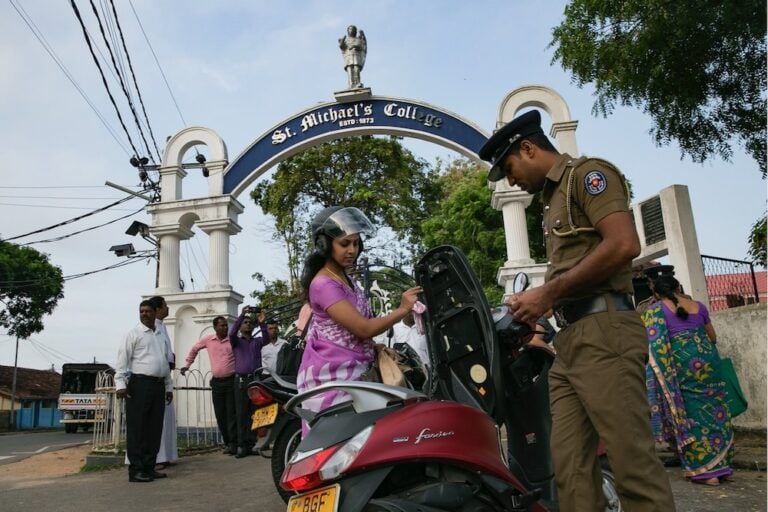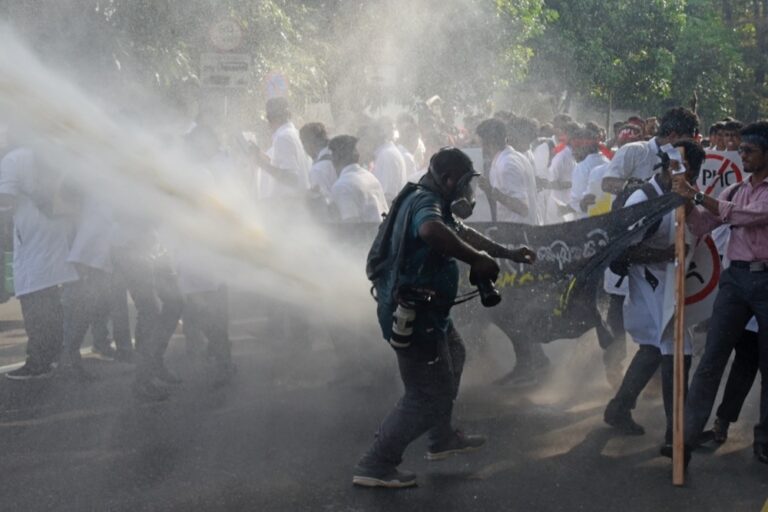(FMM/IFEX) – The following is an FMM media release: Army Commander calls journalists traitors 4 January 2008, Colombo, Sri Lanka – The FMM is deeply disturbed to note that the commander of the Sri Lankan army, Major General Sarath Fonseka, has labeled sections of the media and journalists “traitors”. In an interview published in the […]
(FMM/IFEX) – The following is an FMM media release:
Army Commander calls journalists traitors
4 January 2008, Colombo, Sri Lanka – The FMM is deeply disturbed to note that the commander of the Sri Lankan army, Major General Sarath Fonseka, has labeled sections of the media and journalists “traitors”. In an interview published in the state-controlled Sinhala daily “Dinamina” on 2 January 2008, Fonseka said that this – the “treachery” of the media – was the only obstacle the military could not surmount in its fight to defeat the rebel group Liberation Tigers of Tamil Eelam (LTTE).
Fonseka said: “The biggest obstacle is the unpatriotic media. I am not blaming all journalists. I know 99 percent of media and journalists are patriotic and doing their jobs properly. But unfortunately, we have a small number of traitors among the journalists. They are the biggest obstacle. All other obstacles we can surmount.”
Fonseka did not go on to name who the “treacherous” and “unpatriotic” journalists are. However, based on a series of abominable statements and actions against media personnel, particularly in the embattled Jaffna peninsula, by sections of the government and the Sri Lankan army, the FMM believes this reference is being made against journalists who question government war propaganda and who report in the public interest on aspects of the ongoing conflict.
The FMM has repeatedly noted that media has a responsibility to report critically on policies and actions of those in power, especially in a time of war. The FMM notes with regret that reports of corruption and gross lapses in security, which have deeply embarrassed the government, have resulted in the naming and shaming of courageous and professional journalists as “traitors”, “pariahs” and “supporters of the LTTE”. For example, in October 2007, in a lengthy article entitled “Mr. Iqbal Athas, stop insulting our soldiers’ sacrifices” and posted on the Ministry of Defense website, the government charged that “Mr. Athas’ recent work raises doubts as to whether he has been assisting in the psychological operations of the LTTE terrorists.” It further reads: “Whoever attempts to reduce public support for the security forces, or attempts to damage the loyalty of the soldiers towards their commanders, in this moment can only be considered as one who serves the cause of the terrorists” (see: http://www.defence.lk/new.asp?fname=20071001_06 ).
Given the context of wanton violence and the culture of impunity in Sri Lanka, the FMM is gravely concerned that this latest statement by the commander of the Sri Lankan army is an open warrant to incite hate and harm against journalists. We firmly urge the government and the Sri Lankan army to desist from making such statements and to respect the rights of journalists, freedom of expression and media freedom.
Since imprecise statements and veiled threats are easy to make and harder to justify, the FMM urgently requests Major General Fonseka provide the names of the media institutions and journalists he considers “traitors” and the criteria he used to come to this understanding.


